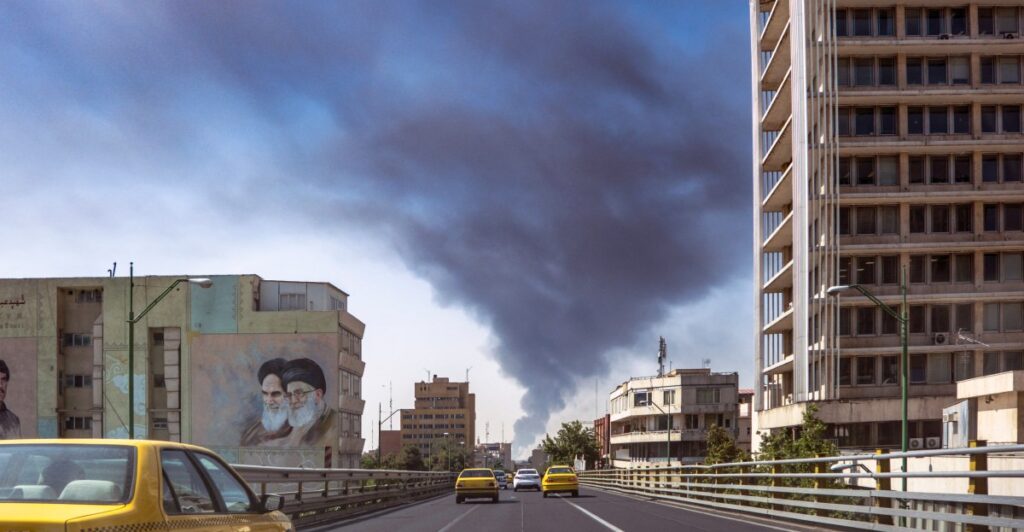
TEHRAN – Smoke rises over Tehran as Israel continues its third day of airstrikes against Iran, intensifying speculation about the true objectives behind these military actions. While Israel claims these strikes are aimed at halting Iran’s nuclear ambitions, the broader implications suggest a potential motive for regime change.
Immediate Impact of the Strikes
Iran’s state broadcaster, a symbol of the regime’s propaganda, was bombed mid-broadcast by Israeli forces on Monday. The attack injured several journalists, drawing condemnation from press freedom organizations. Despite its controversial role, the broadcaster was not a critical component of Iran’s nuclear program.
Israel’s Prime Minister Benjamin Netanyahu has defended the strikes, asserting that they are necessary to prevent Iran from acquiring a nuclear weapon. However, experts suggest that the scope of the operations indicates ambitions beyond mere counter-proliferation.
Key Details Emerge
Behnam Ben Taleblu, senior director at the Foundation for Defense of Democracies, noted, “From the beginning, it was apparent, based on the targeting and Israeli public messaging, that this had the potential to be something much more than just a counter-proliferation operation.”
Retired Gen. Giora Eiland, with close ties to the Israeli government, added that while regime change is not the explicit goal, it remains an implicit hope. This sentiment underscores the complex motivations behind Israel’s military actions.
Could Iran’s Regime Really Fall?
The Iranian regime, weakened by sanctions and internal dissent, faces significant challenges. Nationwide protests have highlighted widespread opposition, yet the regime’s collapse seems unlikely in the near term.
“War itself is not a good thing, but sometimes it presents a window of opportunity,” said Abdullah Mohtadi, an exiled Kurdish Iranian opposition leader. “I hope this will be the case this time.”
However, Ellie Geranmayeh from the European Council on Foreign Relations warns of a potential “rally around the flag” effect among Iranians, uniting them against external threats despite their discontent with the ruling elite.
Regional and International Implications
As tensions escalate, the role of the United States becomes increasingly significant. The Trump administration, known for its “America First” stance, faces pressure to support Israel’s actions. Historically, regime change in Iran has been a contentious topic within U.S. foreign policy circles.
“Wouldn’t the world be better off if the ayatollahs went away and were replaced by something better?” asked Sen. Lindsey Graham, urging U.S. involvement.
Despite these calls, Vice President JD Vance advises caution, emphasizing the focus should remain on Iran’s nuclear capabilities rather than broader military engagement.
What Might Regime Change Look Like?
Reflecting on past conflicts, experts remain divided on the potential outcomes of regime change in Iran. Ali Vaez from the International Crisis Group suggests a scenario akin to Syria’s post-uprising landscape, with a weakened central government struggling to maintain control.
Meanwhile, former Israeli general Eiland envisions a more optimistic future, where a pro-Western populace could rebuild a successful society once the current regime is overthrown.
Background Context
The current conflict builds on years of geopolitical tension between Israel and Iran. Israel’s concerns over Iran’s nuclear program have been a longstanding issue, exacerbated by Iran’s regional influence through proxy networks.
For the Trump administration, the strikes represent a potential pivot from its initial diplomatic approach, as highlighted by recent statements from President Trump calling for Iran’s “unconditional surrender.”
“It could be years of instability, and by the time he leaves the White House, that war would not be over,” said Alex Vatanka from the Middle East Institute, cautioning about the long-term implications of military intervention.
What Comes Next?
As the situation unfolds, the international community watches closely. The potential for prolonged conflict raises concerns about regional stability and the humanitarian impact on Iran’s population.
Moving forward, diplomatic efforts may offer a path to de-escalation, though the prospect of regime change continues to loom over the geopolitical landscape. The world waits to see whether Israel’s actions will lead to a new chapter in Middle Eastern politics or reignite old conflicts.






